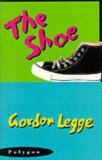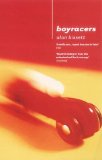It has been decided by those who decide such things that there are only ever seven stories to be told. Roughly speaking these are; The Quest, Voyage and Return, Comedy (otherwise known as The Misunderstanding), Tragedy (or The Fall), Defeating the Monster, Rags to Riches and Rebirth. To this can be added an eighth, ‘A weekend in Grangemouth where nothing much happens’, because this is the plot, such as it is, of Gordon Legge’s ‘The Shoe’.
Gordon Legge’s ‘The Shoe’
by Alistair Braidwood
Like James Kelman’s ‘How Late it Was, How Late’, and one of the great lost Scottish novels Jeff Torrington’s ‘Swing Hammer Swing!’, ‘The Shoe’ is set over three days and like those earlier novels Legge’s deals with alienation, boredom and the feeling of being trapped. The difference is that Kelman and Torrington’s narrators were men apart, looking for escape by any means necessary. ‘The Shoe’ taps into the feeling that was abound in the late 80’s that these situations are so much easier to cope with when the problems are shared, ignored, or preferably, both.
Archie, Big Davie, The Mental Kid and Richard are the foursome attempting to make their way in the world. The main character in ‘The Shoe’ is Archie, but this is really an ensemble piece of writing. I can’t think of another Scottish novel which represents a group of friends so warmly and evocatively. They share more than just history, they have a real friendship that you feel will see them through dark days. This is partly as the novel is set just after the group have left school and still have the roles that were defined in the heat of the playground, and the optimism of youth is still strong enough to block out the feeling that life may never be that easy again.
This group dynamic is fortified by shared love of football, (but, pointedly, a hatred of sectarianism. Davie is a Rangers fan; Mental and Archie both Celtic fans.) drink, sex (or the quest for sex) and, most significantly music. These are the ways they suppress the reality of the dole, or poorly paid jobs with no prospects. Ok, it’s not an original premise, but it is written with a real sense of humour and empathy which is rare, and the novel never becomes sensationalist or mawkish, which actually makes it all the more poignant.
As the novel moves towards its conclusion and the group to the pub Legge picks up the pace. He manages to convey the surreal atmosphere that only exists in a pub, where time becomes relative as the rounds progress and it’s a toss up if the night will end with a kiss or a kick. The sort of place where old grudges which are still harboured from school are replayed as there are no other places for anyone to go, and all the various ‘tribes’ still have their own patch. It’s a brilliant piece of writing. The characters revert to the roles that they spend the rest of the week trying to escape as they try and understand the adult world. All the hopes and fears belong to the world that they’ve just left behind, as these are easier to deal with than those that are to come. But there is never a sense of despair. Legge manages to convey that, as these events are happening, this may just be the best time of their lives.
Perhaps the reason that the reader doesn’t worry about Archie, Davie, The Mental Kid and Richard is that these are obviously intelligent and capable people. A criticism of the novel from some people is that the dialogue is too articulate and knowing, that it is unrealistic. But such a point of view strikes me as more than a little condescending. The language is fantastic; the patter between the characters brilliantly replicates that between those who are comfortable in each others company. The piss-taking stays the right side of cruel, and the cultural references don’t grate with me. Except the naming of the dog as ‘Dostoevsky’; Gordon, you’ve taken that too far.
Music is important in a lot of the novels that have featured on these pages, but in 1989, when the novel was published, this was another rarity in Scottish literature. As I’ve said before, this is something that is difficult to pull off without the writer appearing as if they are just showing off their record collection. Legge manages the trick with ease. He manages to convey the eclectic tastes of the music fanatic, the line between certainty of knowing what constitutes good music, and the need to devour the thoughts of others. The section where we are told of Richard’s reading tastes: ‘Julie Burchill, Tony Parsons, Jane Suck, John Ingham, Jon Savage and the old guard: Charles Shaar Murray, Giovanni Dodoma and Nick Kent’ says so much more than lists of records ever could.
It’s a clever move by Legge to have the secondary character of Richard as the novel’s arbiter of musical taste as that adds distance to the writer himself. Writers who make music a central part of their novels should take heed at the casual confidence that Legge shows. It’s the sort of attitude that sees an interviewer at a job interview ask the question: ‘Right, name 50 singles by The Fall’, or, when looking at a picture of a triumphant Marvin Hagler Archie comment ‘Hagler looked like the first few seconds of Jimi Hendrix’s ‘Purple Haze’ come to life’. This is a novel of obsession and passion, be it for unattainable women, football, movies, but more than anything else music. It is the glue which keeps these four together.
As an appropriate musical interlude, here’s just one of those The Fall singles. This is ‘Mr Pharmacist’:
httpv://www.youtube.com/watch?v=56dxJjXbnjg
I’m currently reading Alan Warner’s new novel, ‘The Stars in the Bright Sky’, which brings together most of the characters first encountered in his 1999 novel ‘The Sopranos’. It makes me realise the debt that certain successful Scottish writers seem to owe to Legge, and this book in particular. Scottish novels that had been around before ‘The Shoe’ had tended to concentrate on a single character who stood apart from any group. While there is still an aspect of this in Legge’s novel, (this is Archie’s tale after all), the sense of camaraderie and shared experience between a group of friends was unusual. Afterwards there were successful novels such as the aforementioned ‘The Sopranos’, ‘Trainspotting’, John Burnside’s dark novel about the middle-aged ‘friends’ ‘The Mercy Boys’ and next month’s novel, Alan Bissett’s ‘Boyracers’, all of which looked at those well worn themes of class, politics, gender and the like within a group dynamic. This may be coincidence, but I’d like to think not.
Re-reading ‘The Shoe’ is as comforting and enjoyable for me as listening to Teenage Fanclub’s ‘Grand Prix’ or Prefab Sprout’s ‘Steve McQueen’, or sticking on an early Woody Allen film. They may be familiar, but that familiarity makes them all the more enjoyable. It’s like catching up with an old friend. This is a book to keep in the box marked nostalgic treats, ready to break into when you’re feeling the world’s weight bearing down.
Alistair
——-
Buy ‘The Shoe’ along with all the books that we deal with in ‘Indelible Ink’ at the Dear Scotland shop:
Further thoughts on Scottish books, film, music, comedy, theatre and the like can be found at scotswhayhae which now has a Facebook home.
Next month’s novel: Alan Bissett’s ‘Boyracers’ makes such a good accompaniment to this month’s ‘The Shoe’ that you may think this column is cunningly planned. Published in 2001, this is perhaps the book that Legge would have written 10 years on. Legge’s novel is set ‘somewhere between Edinburgh and Glasgow’ (Legge is from Grangemouth) while ‘Boyracers’ is unashamedly set in Falkirk, just up the road.
Bissett is one of the best novelists in Scotland today, and going for the title of ‘hardest working man in show business’. I almost picked his superb second novel, ‘The Incredible Adam Spark’ but I think it’s important to follow some of these writers from the beginning.
Next 5 books:
1. Alan Bissett Boyracers (Jul)
2. Iain Banks The Wasp Factory (Aug)
3. Anne Donovan Buddha Da (Sept)
4. Alasdair Gray Lanark (Oct)
5. James Robertson The Fanatic (Nov)


